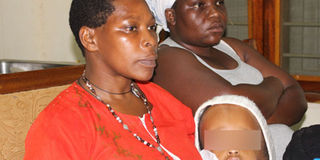Prime
High cases of hydrocephalus worry Masaka health officials

Worry. A woman feeds a child with hydrocephalus at Masaka Regional Referral Hospital last Thursday. PHOTO BY GERTRUDE MUTYABA
What you need to know:
The condition. Hydrocephalus is a condition that occurs when fluid builds up in the skull and causes the brain to swell
Health workers are worried about the rampant cases of children suffering from hydrocephalus in Masaka Regional Referral Hospital.
Dr Kenneth Pascal Ochom, a senior physiotherapist at Masaka hospital, said on average, the hospital receives about 14 children with hydrocephalus every week.
“This health condition was unheard of in the past and we never used to receive patients here, but during our special clinic every Thursday, we get 14 patients, which indicates that there is a big problem in our community we need to swiftly address,” he said in an interview last weekend .
Hydrocephalus is a condition that occurs when fluid builds up in the skull and causes the brain to swell.
Last week, Shyne Uganda, a non-government organisation responsible for looking after children diagnosed with hydrocephalus, organised a workshop in Masaka Town to educate health workers and their mothers on how to handle children with such a condition.
Dr Ochom said the hospital can only afford to have clinic days for the patients for assessment but they are later referred to other hospitals .
“Due to limited resources and lack of specialists here, we normally refer the victims to CURE Children’s Hospital of Uganda (CCHU), a private facility in Mbale District that offers specialised treatment,” he said.
CCHU offers specialised treatment that includes surgical operation to drain the fluid from the brain, while others go to Organised Useful Rehabilitation Service (OURS), a community-based Rehabilitation Programme in Mbarara District for children with disabilities.
Dr Ambrose Ganshanga attached to OURS in Mbarara said on average, they operate about 100 children every day.
He said some parents still attribute the condition to witchcraft and they decline to take their children to hospital.
“Others take them to Pentecostal churches hoping God will perform miracles for them, this is because treatment for hydrocephalus is very expensive and many parents cannot afford fees for operation since a number of surgeries are supposed to be carried out,” he said .
He said they charge between Shs800,000 and Shs950,000 depending on the nature of the operation and about three to four operations have to be carried out.
Ms Florence Ssanyu, a resident of Nakayiba Village in Masaka Municipality, said she was abandoned by her husband and all her family members after her daughter was diagnosed with hydrocephalus.
“I am experiencing a big challenge in my community where people make all sorts of accusations against me, some say I took family planning pills during pregnancy that made my child develop a big head and others claim I practice witchcraft and God is punishing me,” she said .
Ms Sanyu said she gave birth to a fine baby but the condition changed after three months out of the blue.
Ms Brendah Nabukeera, a resident of Kaseera Village, Mukungwe Sub-county in Masaka District, claims the situation her daughter is in today was caused by a nurse at Masaka regional hospital, who gave her injection on the head and since then, the head is increasing in size.
“My daughter is now eight years and my fear is that she may not attain education despite her ability to study,” she said, adding: “Many schools have rejected her and most of them advise me to take her to a rehabilitation centre.”
Ms Ruth Nalugya, the director Shyne Uganda, said they have managed to restore hope among many mothers, who give birth to children with hydrocephalus, through supporting them with wheelchairs, money to enable them take their children for operation, among other needs.
She , however, advises parents not to give up on their children because hydrocephalus is a curable disease in case the required operations are all done.
“My daughter was operated three times and I am now the happiest mother in the world, she is now in Primary Three after a long journey I went through,” she added.
However, the Masaka community development officer, Ms Lillian Musisi, advised parents with children diagnosed with hydrocephalus to form an association so that the district and other well wishers can support them .
Doctors say about 60 per cent of hydrocephalus cases in Africa are due to infections such as germs, others are caused as a result of head injuries and tumors, among others, yet sometimes hydrocephalus develops while the child is still in the uterus (mother’s womb).
Doctors advise expectant women to give birth in the hospital not at home or small village clinics, and that they should avoid use of old razor blades to cut umbilical cord as it is a source of infections [germs].
A research conducted by Cure Hospital and conservative prevalence rates from National Institute of Health indicates that between 3,600 and 5,400 children in Uganda are born with or develop the condition every year.


